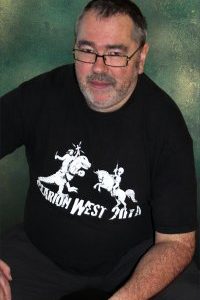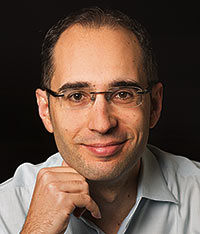Eileen Gunn: Other Lands
 Eileen Katherine Gunn was born June 23, 1945 in Dorchester MA and grew up south of Boston. She attended Emmanuel College, a Catholic college, earning a BA (1967) in History with a minor in English, began working as an advertising copywriter, then moved to California to pursue fiction writing. In 1976 she attended Clarion, and afterward wrote while supporting herself by working in advertising. She was an early employee at Microsoft, where she worked as director of advertising and sales promotion in the mid-’80s, finally quitting because she couldn’t concentrate on writing while working 100+ hour weeks. In 1988 she joined the board of directors of the Clarion West Writers Workshop, and in 2001 began editing online magazine The Infinite Matrix, which ran until 2008.
Eileen Katherine Gunn was born June 23, 1945 in Dorchester MA and grew up south of Boston. She attended Emmanuel College, a Catholic college, earning a BA (1967) in History with a minor in English, began working as an advertising copywriter, then moved to California to pursue fiction writing. In 1976 she attended Clarion, and afterward wrote while supporting herself by working in advertising. She was an early employee at Microsoft, where she worked as director of advertising and sales promotion in the mid-’80s, finally quitting because she couldn’t concentrate on writing while working 100+ hour weeks. In 1988 she joined the board of directors of the Clarion West Writers Workshop, and in 2001 began editing online magazine The Infinite Matrix, which ran until 2008.
Gunn’s first story, ‘‘What Are Friends For?’’, appeared in 1978. Never a prolific author, Gunn produced only a handful of stories over the next decades, including two Hugo nominees, ‘‘Stable Strategies for Middle Management’’ (1989; also included in The Norton Book of Science Fiction) and ‘‘Computer Friendly’’ (1990). Collection Stable Strategies and Others (2004) gathered most of her prior output, along with several new stories, including Nebula Award finalist ‘‘Nirvana High’’ (with Leslie What) and winner ‘‘Coming to Terms’’; the collection itself was a finalist for World Fantasy and Philip K. Dick Awards, and was shortlisted for a Tiptree award. New collection Questionable Practices (2014) includes stories written in the past decade, plus two unpublished stories and collaborations with Rudy Rucker and Michael Swanwick. Her essay on science fiction and the future appears in the May, 2014 issue of Smithsonian magazine.
Gunn lives in Seattle with typographer and book designer John D. Berry, her partner of 35 years.
Excerpts from the interview:
‘‘Just to be absolutely clear about it, science fiction does not predict the future. Science fiction may address the future, some stories may be set in the future, but it’s not about the future, although sometimes it’s about creating the future. When I interviewed William Gibson a couple months ago, I whined, ‘Why do people want SF writers to predict the future?’ I thought Gibson’s answer, which was edited out of the final article, was particularly informative: he said (and I quote): ‘I take it for granted, both as a reader and a writer of SF, that one aspect of the potential pleasure of the text may be pretending to believe the future as presented is a likely outcome.’
‘‘But the usefulness of science fiction is not that it predicts the future, and to come up to a writer afterwards and say, ‘You got that wrong’ is dumb – although, of course, everyone is happy to think they got it ‘right.’
‘‘What science fiction does, especially in those works that deal with the future, is help people understand that things change and that you can live through it. Change is all around us. Probably things change faster now than they did four or five hundred years ago, particularly in some parts of the world. As Gibson said decades ago, ‘The future is already here – it’s just not evenly distributed.’ And it’s uneven in interesting ways: there are people in some parts of the world for whom change is slow, and life is much the same as it was when they were born. But because they don’t have the old technology, the dead weight of the infrastructure (telephone wires, say), they can leapfrog ahead of us.
‘‘Writers don’t use science fiction to understand what’s going to happen. They use it to examine what’s happening now – and yet everyone’s reality of that is a bit different. We don’t live in ‘‘a science fiction age,’’ as the puffery goes: we live in the present. It’s always the present where we live.”
…
‘‘All fiction has value, whether it’s science fiction or not. It helps people deal with their lives in the present, helps them understand their own emotions and the emotions of people around them. All fiction can take you to other lands, and introduce you to people whose lives and struggles and opinions you can’t even imagine until you read their stories. It’s not just science fiction that does this. But science fiction editors have certain goals, and the audience has certain expectations, of what kind of imaginings they’re going to read, and hard SF offers a special –- even peculiar – view of the universe and how it works.”
…
“The novel I’m working on is based on an idea Michael Swanwick sent me in the mail. (We’re not collaborating: he just said, ‘Write this!’)
‘‘It’s set in the 19th century in the US and Canada, and involves chattel slavery and gender relationships. What do those two things have in common and how do they differ?
‘‘In writing this, I am working well outside my comfort zone: there are so many things to overlook or get wrong, in terms of historical and cultural detail and of complex interpersonal relationships. But there’s a lot of historical source material out there, and a huge body of work by black writers –- history, memoir, and fiction – that explores the complex social aspects of being enslaved and recovering from it.
‘‘I’ve written about 35,000 words of the novel, and the two protagonists in it, one white and one black, are coming forth and talking. (But not yet to one another.) I think the characters you write are always reflections of yourself and of how you see other people, whether through reading or social interaction. You don’t write other people any more than you predict the future. These characters who come out of your head may do stuff that surprises you, but it’s all stuff from inside you. So in some ways, writing outside your own culture is impossible, as it’s inextricable from how you see the world. But it’s worth doing, if you, as a writer, can get past the fact that you’re a historical artifact, rather than a vehicle for creating the Truth.”






